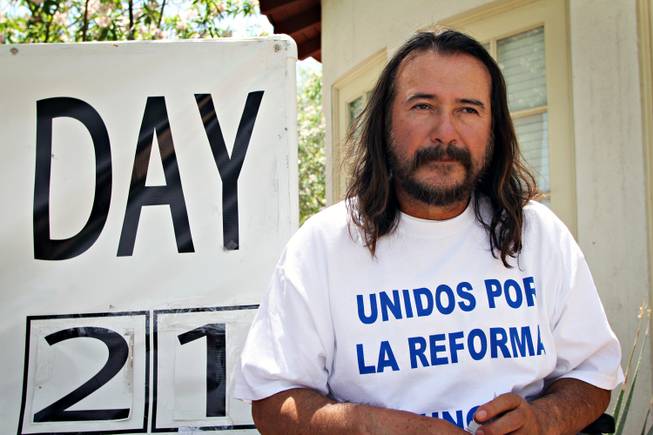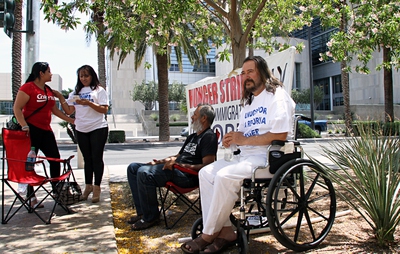
Salvador Zamora, 51, is engaged in a hunger strike to raise awareness of the need for immigration reform. Here, Zamora was on day 21 of his strike, but as of Thurs. May 9, 2103 Zamora had not eaten in 30 days. He says he will end the strike when he sees a favorable result for immigration reform or his body gives out on him, whichever comes first.
Friday, May 10, 2013 | 2 a.m.

Salvador Zamora, 51, has staged a one-man hunger strike across from the Lloyd George Federal Building in downton Las Vegas to support the push for immigration reform. As of May 9, 2013, Zamora had gone 30 days without eating. He drinks eight to 10 bottles of water a day, and five bottles of water mixed with a little bit of lemon juice and two spoon fulls of honey. He has people with him at most time in case of a medical emergency or to help when he is too weak to walk.
Editor’s note: This Q&A is one of two interviews published jointly, one from a staunch opponent of legalizing immigrants residing in the country illegally and the other with a naturalized U.S. citizen from Mexico who is a long-time activist for immigration reform. To see the other Q&A, click here.
Salvador Zamora does not give up easily, and it has taken a toll on his health.
As of Thursday, Zamora was on day 30 of a hunger strike in support of U.S. immigration reform. He has lost 22 pounds since he started in April; doctors are monitoring his deteriorating condition. Zamora sits below a banner marking off the days directly across from the Lloyd George Federal Building, where Senate Majority Leader Harry Reid and Sen. Dean Heller have offices.
On May 1, when thousands turned out for a march in favor of immigration reform, Zamora, already more than 20 days into his strike, tried to participate. He fainted and had to be taken to the hospital in an ambulance. Still he has not quit.
Zamora, 51, was born in Michoacan, Mexico. When he was 16, he set out to immigrate to the United States to “find work and adventure.” He crossed into California illegally and worked various jobs, including harvesting strawberries. He gained legal residency thanks to President Ronald Reagan’s 1986 immigration initiative.
In 2010, Zamora became a U.S. citizen and also spent eight months walking 2,700 miles from California to Washington, D.C., to support immigration reform. Today he is a full-time activist with Unidos por la Reforma (United for Reform).
This isn't his first hunger strike; in July 2011 in Atlanta he protested new laws meant to crack down on those residing in the country illegally.
As the U.S. Senate debates an immigration reform package that touches on everything from high-skilled work visas to border security and a path to citizenship for the estimated 11 million immigrants in the country illegally, the Sun sat down with advocates on the both sides of the immigration issues.
What is your argument to people who say legalization is rewarding people who have broken the law?
What I’d say to them is that in all groups there are bad people and good people, but we are sure that most of the people who have come, have come to work and contribute to this country.
There are myths that say they don’t pay taxes, but most of the immigrants are paying taxes. When they buy things, when they buy houses, when they work in most places, they are paying taxes. The reality is they do pay taxes. And, I also want to say that most people that think the immigrants should be thrown out are not well informed and do not have the correct information. There are special-interest groups that use certain ideas to try and pit people against each other.
For example, we are asking for change in the law, a reform of the immigration laws. At no time have we asked for amnesty, because amnesty is given without anything in exchange. We are saying that immigrants will pay a fine and the immigrants are willing to do their part to earn the permission and opportunity to live here legally.
We know that immigrants that come here have to pay more attention to learning English. We have to learn the necessary things to assimilate to the country. With a little more attention to the way things are done here, we can assimilate better. We should follow the laws and be as constructive members of society as possible.
What do you think the overall benefits of reform will be?
First of all, the people will be more relaxed and can travel more. They will be able to look for better jobs, to study in college and become professionals. Reform will affect everyone, and it will make things better for everyone, no matter who they are. It will help grow the economy.
That is the big reason that should move everyone to support the advancement of immigration reform. If people have better jobs and can move freely, they will buy more cars, more houses and start more businesses. This is a big motivation, even for those who don’t want the immigrants to be able to stay.
How do you respond to those who say terrorist attacks like those at the Boston Marathon show we can’t effectively screen even legal immigrants and reform raises security issues?
I think that is another reason to pass immigration reform. That way they have more control of who comes in and who leaves. The Boston terrorists did not come over the southern border, they came legally. What happened in Boston should be more of a motive to keep fighting for reform so these problems can be fixed.
Are you confident that immigration reform will pass this time?
When I started the march in 2010 I would talk with people every day. I walked for 10 or 12 hours every day, 15 to 25 miles a day. The common question was ‘Hey, do you really think they will pass immigration reform?’ And I would say back: ‘Of course I believe, that’s why I’m walking all this way.’
If I didn’t believe that this would happen, I would be in my house resting. Now, three years later, I’m more convinced than ever that we are about to achieve immigration reform and will realize the goal that activists and organizations have been working toward for 20 years.

Join the Discussion:
Check this out for a full explanation of our conversion to the LiveFyre commenting system and instructions on how to sign up for an account.
Full comments policy